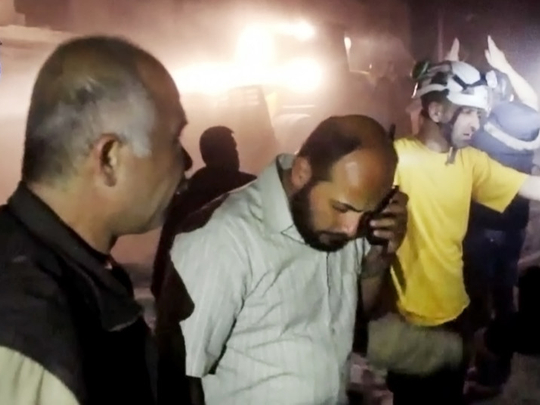
Beirut: As one of the few paediatricians remaining in the Syrian city of Aleppo, Dr Mohammad Wassim Maaz offered hope to tens of thousands of children and their parents trapped in the horror and misery of the five-year civil war. But last month, an airstrike widely believed to have been carried out by the Syrian government destroyed the Al Quds hospital where he worked, killing Maaz and dozens of colleagues, patients and other civilians.
The April 27 strike was the latest of thousands of attacks in recent years on medical facilities in conflicts in the Middle East and elsewhere that have killed hundreds in brazen violation of humanitarian norms. Facilities have been struck in Syria, Afghanistan, Iraq, Yemen and South Sudan.
The attacks have turned the universally recognised symbol of the Red Cross, which is supposed to offer protection and safety, into a deadly target and have exposed the failure of the international community to prevent and punish such crimes.
The UN Security Council has denounced the attacks and demanded that all parties in conflicts protect medical facilities, staff and patients. But some of the council’s most powerful members, who backed the resolution, aren’t blameless.
US forces struck a clinic in Afghanistan last year, killing 42 people. The Pentagon found the attack was a mistake caused by human error and 16 military personnel, including a two-star general, were disciplined. The medical charity Doctors Without Borders, which operated the hospital, has called for an independent investigation.
Medical facilities have also been hit by the US-backed Saudi-led coalition in Yemen.
Russia, too, has been tied to attacks. Its forces backing Syrian President Bashar Al Assad have been accused of intentionally striking hospitals. Al Assad’s military has been charged with deliberately striking civilian targets to crush the will of the population and render rebel-held areas unlivable.
Physicians for Human Rights calls the attacks in Syria the most widespread and systematic assault on health care documented in the world to date.
“Health facilities, which are meant to be places where people can go for relief of suffering, for survival and safety, have become instead places of brutality and death,” said Susannah Sirkin, a director at the New York-based group.
The Geneva Conventions state that hospitals, doctors and patients are off-limits in conflicts. Attacking them constitutes a war crime. Violations have happened before, but aid groups say the cruelty and frequency in recent years has been unprecedented.
Nearly 740 doctors and staff have been killed in more than 360 attacks on hospitals in Syria since the start of the civil war in 2011, according to Physicians for Human Rights. A study by the International Committee of the Red Cross documented some 2,400 attacks against patients, health personnel and medical facilities in 2012-2014.
Doctors Without Borders, known by its French acronym, MSF, says that least 100 staff members, patients and caretakers were killed, and at least 130 were injured, in aerial bombing and shelling attacks on more than 80 MSF-supported and run health structures in 2015 and early 2016.
Hospitals and physicians in the Middle East and elsewhere have been attacked simply for treating people on both sides of the conflict or because the facilities were located near what was perceived to be a military target.
Treating patients in war zones has become so dangerous that some hospitals have gone undercover and residents in a number of communities in Syria have protested against efforts to reopen bombed hospitals to avoid being hit again, according to MSF.
On Monday, 80 governments and dozens of world leaders, including German Chancellor Angela Merkel, inaugurated the first-of-its-kind World Humanitarian Summit in Istanbul. The summit, called by the UN Secretary General Ban Ki-moon in response to pressing humanitarian challenges, was set to be attended by 6,000 people including heads of aid groups and private sector leaders. But MSF, in a strongly worded statement, said it was pulling out, calling the summit “a fig-leaf of good intentions”.
According to the international organisation, the two-day World Humanitarian Summit will “put states on the same level as non-governmental organisations and UN agencies, which have no such powers or obligations”, further minimising the responsibility of the states.
Al Assad’s government denies targeting hospitals or other civilian areas and accuses the rebels of striking government clinics. But Syria’s top diplomat to the UN, Bashar Ja’afari, has accused MSF of being French spies and said they should be blamed for attacks on their facilities because they are operating in an area not controlled by the government.
The attack on the Al Quds hospital brought attention to the dangers faced by medical care workers. Closed-circuit footage of the last moments of Maaz’s life was seen worldwide. They show him clad in green scrubs and slippers, moving busily around the ward and tending to his small patients.
Maaz, 36, was the senior paediatrician in Aleppo, a northern city besieged by government, Kurdish and Daesh fighters. He was a soft-spoken bearded man with balding hair, so devoted to his patients that he turned down a scholarship to study in France and opportunities to work in safer areas. He slept in the hospital to look after his patients during the night, colleagues said.
“By killing a doctor, the regime and its allies are killing hundreds of children that he was treating,” said Dr Osama Abo Al ezz, a general surgeon in Aleppo.
The Al Quds hospital recently reopened. Another doctor has volunteered to take over Maaz’s duties. When he spoke to The Associated Press, he asked that only his first name, Hatem, be used because he fears being targeted.
“If he [Al Assad] keeps hitting hospitals, we will set up hospitals underground,” Hatem said. “We are staying here.”












